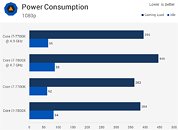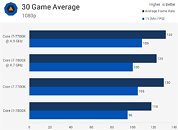Tuesday, July 18th 2017

Benchmarks Find Intel Core i7-7700K Better Than i7-7800X for Gaming
Over at Techspot, Steven Walton managed to get a hold of Intel's new six-core, 12-thread Core i7-7800X CPU, and chose to take it for a spin over a levy of gaming benchmarks. The results don't bode particularly well for Intel's new top i7 offering, though: it is soundly beat by its smaller, svelter brother in virtually all gaming tasks.
Out-of-the-box results are somewhat in line with what we would expect: the Core i7-7700K does bring about a base clock increased by 700 MHz compared to the i7-7800X (4.2 GHz vs 3.5 GHz), and has a higher boost clock to boot (4.5 GHz vs 4 GHz.) And as we've seen over and over again, including with Intel rival AMD's Ryzen offerings, frequency usually trumps core count when it comes to performance when applications are exposed more than four cores. And this leads to Walton's results: the Core i7 7700K is still king in pure FPS terms, coming in with a much more attractive proposition than the 7800X in both minimum and maximum FPS, as well as power consumption.Now, to be fair, most of us were probably expecting that: consumer application optimization for high core-count processors (if we can actually call a six-core a high core-count processor in a soon to be Threadripper-infused world, but I digress) is sorely lacking. However, what really paints Intel's i7-7800X in a bad light is that its performance continues to be lacking even when it has a frequency advantage over the 7700K. As you can see in the performance metrics, a Core 17-7800X overclocked to 4.7 GHz (with a 500 MHz advantage over stock clocks of the 7700K and 200 MHz over its Boost clock) still performs slower than it. The stock 7700K has 5% higher minimum and maximum framerates than the 7800X, despite being clocked lower, having a ridiculously lower amount of L2 cache, and having about the same total L3 cache (which actually results in an about 30% lower available L3 cache per core.) And these lower frame rates are delivered with a 41% higher idle power consumption, and 23% higher gaming power consumption. Check the source link for some detailed benchmarks. As for all this, it seems that while Intel likes to take digs on AMD for their "glued-together" desktop dies repurposed for servers, Intel's 7800X, which has its cache hierarchy and core interconnect re-architected for servers, may be little more than a repurposed server CPU for the desktop crowds...
Source:
Techspot
Out-of-the-box results are somewhat in line with what we would expect: the Core i7-7700K does bring about a base clock increased by 700 MHz compared to the i7-7800X (4.2 GHz vs 3.5 GHz), and has a higher boost clock to boot (4.5 GHz vs 4 GHz.) And as we've seen over and over again, including with Intel rival AMD's Ryzen offerings, frequency usually trumps core count when it comes to performance when applications are exposed more than four cores. And this leads to Walton's results: the Core i7 7700K is still king in pure FPS terms, coming in with a much more attractive proposition than the 7800X in both minimum and maximum FPS, as well as power consumption.Now, to be fair, most of us were probably expecting that: consumer application optimization for high core-count processors (if we can actually call a six-core a high core-count processor in a soon to be Threadripper-infused world, but I digress) is sorely lacking. However, what really paints Intel's i7-7800X in a bad light is that its performance continues to be lacking even when it has a frequency advantage over the 7700K. As you can see in the performance metrics, a Core 17-7800X overclocked to 4.7 GHz (with a 500 MHz advantage over stock clocks of the 7700K and 200 MHz over its Boost clock) still performs slower than it. The stock 7700K has 5% higher minimum and maximum framerates than the 7800X, despite being clocked lower, having a ridiculously lower amount of L2 cache, and having about the same total L3 cache (which actually results in an about 30% lower available L3 cache per core.) And these lower frame rates are delivered with a 41% higher idle power consumption, and 23% higher gaming power consumption. Check the source link for some detailed benchmarks. As for all this, it seems that while Intel likes to take digs on AMD for their "glued-together" desktop dies repurposed for servers, Intel's 7800X, which has its cache hierarchy and core interconnect re-architected for servers, may be little more than a repurposed server CPU for the desktop crowds...


136 Comments on Benchmarks Find Intel Core i7-7700K Better Than i7-7800X for Gaming
Yeah, how is this news??? 700 mhz clockspeed difference amd most games cant use more than 4c/8t... i guess thanks for the confirmation techspot!!
Come on, people didn't see a 700MHz higher clock would effect gaming performance?
Also, these are not rebrands with just aesthetic changes.. it went back to a fivr, mesh is new... i mean, its x86, lol!
So with that said, I propose this question... If Intel were to take almost the same chip that we have here yet apply the same cache architecture that the 7700k has, would it suffer from the same performance penalties or would it start to perform similar to that of the older 7700k?
It seems that many readers are not actually reading what was written, with so many saying "well dun, the 770k is higher clocked". Even when OCed above the 7700k, the 7800x was still slower.
which is amazing. How hard did intel bungle the skylake x platform to manage that? The cache changes shouldnt have made that big of an impact, unless core i was more cache dependent and the rapid changes screwed up something else.
But if you like a challenge, buy a Ryzen 1600X.
The only reason the difference wasn't higher o/c to o/c was that many games were already hitting fps limits. When they were not, the differences were HUGE for 200 mhz.
Bah! I'm off to have an ice cream.
"The issue is that the normal 7900K results were done on older BIOS versions, while the new ones are done on the latest BIOS versions that support Turbo 3 without any software requirements. You will see results in line with the better performing 7900X results, but I do know some other media who were getting the same low gaming scores I was, and that was because Turbo 3 wasn't working."
Same issue here with 7800X.